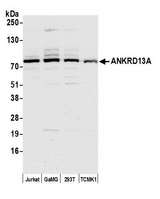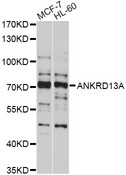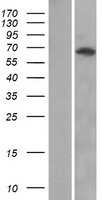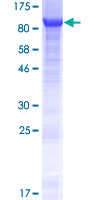order histories, retained contact details for faster checkout, review submissions, and special promotions.
Forgot password?
order histories, retained contact details for faster checkout, review submissions, and special promotions.
Locations
Orders Processing,
Shipping & Receiving,
Warehouse
2 Shaker Rd Suites
B001/B101
Shirley, MA 01464
Production Lab
Floor 6, Suite 620
20700 44th Avenue W
Lynnwood, WA 98036
Telephone Numbers
Tel: +1 (206) 374-1102
Fax: +1 (206) 577-4565
Contact Us
Additional Contact Details
order histories, retained contact details for faster checkout, review submissions, and special promotions.
Forgot password?
order histories, retained contact details for faster checkout, review submissions, and special promotions.
ANKRD13A
ankyrin repeat domain 13A
Ubiquitin-binding protein that specifically recognizes and binds 'Lys-63'-linked ubiquitin. Does not bind 'Lys-48'-linked ubiquitin. Positively regulates the internalization of ligand-activated EGFR by binding to the Ub moiety of ubiquitinated EGFR at the cell membrane.
| Gene Name: | ankyrin repeat domain 13A |
| Synonyms: | ANKRD13A, Ankyrin repeat domain 13, ANKRD13, NY-REN-25 antigen, NY-REN-25, Ankyrin repeat domain 13A, Protein KE03 |
| Target Sequences: | NM_033121 NP_149112.1 Q8IZ07 |






If you do not find the reagent or information you require, please contact Customer.Support@LSBio.com to inquire about additional products in development.









